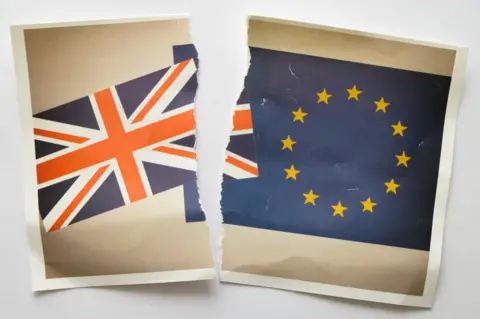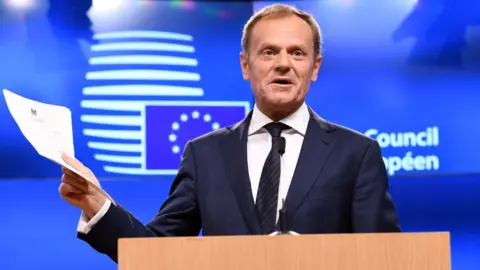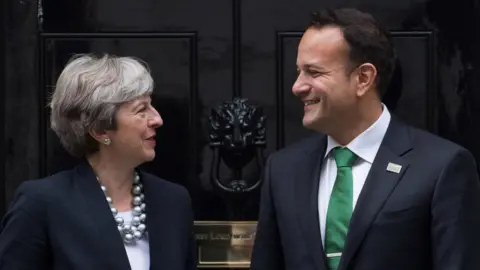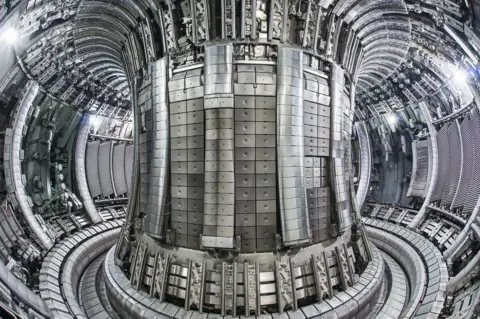Perplexed about Brexit? Here are six things to watch
 Getty Images
Getty ImagesWe're now halfway between the Brexit referendum and the day the UK is supposed to leave the EU, and the entire process seems to be clouded in confusion.
Don't take my word for it. I've spent the last three weeks talking to a variety of people, from Irish thoroughbred breeders to chief executives of construction companies, from nuclear scientists to taxi drivers. And everyone wants to know where on earth all this is heading.
I've seen it argued that Leavers and Remainers find it difficult to have a constructive debate because the Leave side tend to focus on broad political themes (Take Back Control, anyone?) while the Remain side focus on the detail.
 Getty Images
Getty ImagesThat's why some advocates of Remain still have difficulty accepting the fact that a big political decision was made in the referendum.
At the same time a government that has committed itself to Brexit, but is divided about what that actually means, is trying to master the detail in record time.
And if there's one thing about Brexit that does become clearer every week, it is that this is a process of unprecedented complexity. Like unstitching a blanket, or unbaking a cake: you can choose your own simile, but the inference is clear.
No advanced industrial economy has ever tried to do anything quite like this before - extricating itself in an astonishingly short space of time from more than 40 years of shared sovereignty and close economic co-ordination with its nearest neighbours..
No wonder we're still a wee bit perplexed. Explaining Brexit is a bit like stapling jelly.
But here, slightly at random and in no particular order, are a few things that emerged from our series, which may be worth keeping an eye on.

1. Direct effect
 Getty Images
Getty ImagesIf a deal is to emerge soon on the issue of citizens' rights (for EU citizens here in the UK in particular) then the notion of "direct effect" is likely to loom large.
It is a really important principle of the European Court of Justice, because it means individuals can invoke European law before national courts.
In this case, the Brexit withdrawal agreement (with European law enshrined within it) could be written directly into UK law rather than relying on a separate piece of UK legislation to implement it.
The EU thought that the UK had conceded this point; if that turns out not to be so, it will cause problems.
2. Ireland
 Getty Images
Getty ImagesIt's not just about the border, and the effect on Northern Ireland, critically important though that is.
A total of 80% of Irish exports go to or through the UK, which is also critical for Irish energy supplies, and no other country outside the UK has nearly as much at stake in the Brexit debate as the Republic of Ireland.
"There is hardly any area of Irish life that won't be affected in one way or another," says Tony Connelly, author of the book Brexit and Ireland.
That means Dublin needs a good deal with the UK after Brexit. But it doesn't mean Ireland won't play tough.
In the Brexit negotiations it is sticking with the mantra of the unity of the EU27, and exasperation with UK politics is mounting.
3. Robots
 Getty Images
Getty ImagesAnna Wallace, the director of political relations at the professional services firm PricewaterhouseCoopers, told the story of a manufacturing company in Wales that has decided to replace EU migrant workers with machines, rather than with a locally hired workforce.
"They knew they were probably going to do that in five years' time," she says. "But good businesses are now thinking about all of those things together."
It is a reminder that Brexit is only one part of a much larger economic debate, as another technological revolution looms large.
Automation would be changing the working lives of many people come what may (in fact, it already is). But the effect of Brexit will probably speed up things.
The good thing about change? It always brings opportunity as well as risk.
4. The labour market
 Getty Images
Getty ImagesThe end of the free movement of people from the EU could well lead to some liberalisation of UK immigration policy for the rest of the world.
That may not come as a surprise to many economists who deal with immigration issues, but it may not have been what many Leave supporters thought they were voting for.
The UK will still need immigrant labour to keep its economy moving.
Even the pressure group Migration Watch advocates the creation of new schemes for seasonal agricultural workers from the EU, and for young people between the ages of 18 and 30 to work in the UK for up to two years.
But immigration policy isn't just about the UK choosing whom it wants. They have to want to come to the UK too. The rest of the world beyond Europe may have to fill some gaps in the market.
5. JET
 EUROfusion Consortium
EUROfusion ConsortiumThe Joint European Torus in Oxfordshire can lay convincing claim to be the greatest scientific experiment in the UK. The long-term aim is to produce an unlimited supply of clean energy through nuclear fusion.
But Jet is run under the auspices of Euratom, the European Atomic Energy Community. And alongside the EU, we're leaving Euratom too.
The trouble is that funding for Jet runs out at the end of 2018. And until we know the future relationship between Euratom and the UK after Brexit, no one can say for certain that funding will be extended.
Surely, you cry, they won't just pull the giant Torus plug?
"I work in fusion research so by definition I think I'm an optimist," says Ian Chapman, the chief executive of the UK Atomic Energy Authority.
"But everybody is anxious, and everybody wants a resolution to this as quickly as possible."
6. (Continent cut off by) fog
 Getty Images
Getty ImagesYou probably know this one already, but it is worth repeating. When it comes to Brexit, no one has any idea what is going to happen next.
"I've been following British politics professionally for almost 50 years," says the pollster Peter Kellner.
"Never before have I been so uncertain as to where British politics has been heading.
"We're looking at a mountain ahead of us shrouded in fog. We can't see the pass and we don't know what's on the other side."
The battle for Brexit seems to have been around forever, but it may be that the critical phase is only just beginning. Stay tuned.
Chris Morris presents Brexit: A Guide for the Perplexed on BBC Radio 4. You can listen online, or download the programme podcast.
